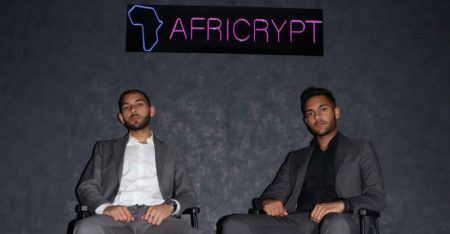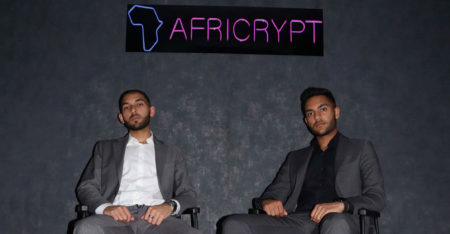 Barely a week after a mystery “white knight” offered creditors US$4-million (R64-million) to bail out investors in the failed Africrypt cryptocurrency scheme, another mystery investor has appeared with a better offer of $5-million (R80-million), equivalent to 65c in the rand.
Barely a week after a mystery “white knight” offered creditors US$4-million (R64-million) to bail out investors in the failed Africrypt cryptocurrency scheme, another mystery investor has appeared with a better offer of $5-million (R80-million), equivalent to 65c in the rand.
The first offer made in November was also for $5-million, though only $4-million of that would go to creditors, with the remaining $1-million going to the running of the company.
This latest offer of $5-million is a simpler offer, with a timeline of seven days for acceptance, after which the “white knight” will purchase and take cession of the claims.
Africrypt collapsed in April after its accounts were supposedly hacked and emptied of all funds. But it turns out this was not the first hack to have plagued the founders of Africrypt – brothers Raees and Ameer Cajee – and their investors.
A previous investment scheme of theirs was supposedly hacked in May 2019, causing more than a few Africrypt investors to suspect foul play. Two hacks in less than three years seemed a stretch too far for some investors, who suspect the Cajees are now using proxies to make an offer of compromise with the hope of avoiding jail time.
The latest offer of 65c in the rand is on investors’ deposited amount, not the current value of the “hacked” bitcoin or ethereum.
Investors who deposited into Africrypt in September 2019 would have paid about R120 000 for their bitcoin – which is today worth about R800 000. This offer effectively means investors will be paid out less than R80 000/bitcoin, for an asset that is worth 10 times that today.
Outrageous
Africrypt was run by the Johannesburg-based Cajee brothers, who solicited funds from investors by promising returns as high as 10%/day using a computerised trading algorithm. These promises were even more outrageous than MTI’s claims of 0.5-1.5% returns a day.
MTI was placed in provisional liquidation a year after failing to pay out members’ requests for withdrawals. MTI also claimed to have a computerised trading algorithm, though no evidence of this was found by the Financial Sector Conduct Authority (FSCA) when it looked into it.
Similarly, there is no evidence the Cajees were trading the cryptos entrusted to their care. The Cajees disappeared around the time of the alleged hack, and are believed to be in the Middle East.
The first offer to buy out the claims of Africrypt investors made in November came with a catch: Anyone accepting the offer would have to withdraw criminal charges against the Cajee brothers and their affiliated entities.
 This condition was likely unlawful, and is referred to as “compounding” in law, which is agreeing not to prosecute a crime in return for a reward.
This condition was likely unlawful, and is referred to as “compounding” in law, which is agreeing not to prosecute a crime in return for a reward.
The second rescue offer presented to investors last Friday (3 December) carries no obligation to withdraw criminal charges.
The first offer specified that the Cajees would be employed by Africrypt, which would be resuscitated as a trading entity so that investors could potentially earn back their full investment.
Investors hoped this would provide them with an opportunity to interrogate the Cajees as to the circumstances surrounding the alleged hack, and whether it was a genuine hack or an inside job. The Cajees have maintained the hack was genuine, and denied any involvement in what some believe was a heist, according to the BBC.
There are of course suspicions that this offer is coming via a proxy for the Cajees, and that we are being paid out with our own money
The identities of both the first and second “saviour” investors remain unknown, though Ruann Kruger, legal representative for the Africrypt liquidators, says the second investor is a company. “I am prevented from disclosing the identity of the company at this stage due to a non-disclosure agreement,” he said. “We have no idea of the identity of the first investor.”
Kruger said that so far, 35 out of 181 investors have signalled their intention to accept the offer.
Said a representative for some investors: “There are of course suspicions that this offer is coming via a proxy for the Cajees, and that we are being paid out with our own money. Either way, this is a clever tactic by whoever the investor is. It’s a divide and rule tactic.
“What I see happening here is the smaller investors are going to accept the offer, then the larger investors will be dealt with piecemeal. It’s a clever strategy, but a high-risk one, because I believe some of the investors will not accept this offer, and will hold out for a better offer.”
‘No proof’
Attorney Gerhard Botha, who is representing some of the investors, said any offer of 65c in the rand in any liquidation situation is not a bad deal.
“You must remember that up to now, there’s been no offer on the table. There’s also no proof that there was a hack, and there’s no proof that the money was actually invested [by the Cajees]. There is a strong possibility that this is a great deal for the Cajees, both legally and financially, but at the end of the day investors will make a decision based on purely commercial considerations,” he added.
In a letter to Africrypt investors sent out on Friday, the joint provisional liquidators said they had not received any further communication or feedback from the first “third-party investor” on the amended terms of the compromise offer – which attempted to indemnify the Cajees against criminal prosecution.
This raises suspicions among investors that the Cajees were behind the offer, which they decided to drop when it was pointed out that they could not buy their way out of potential jail time.
The letter from the provisional liquidators says the second offer of compromise is “a good, firm and less complicated offer that is open for acceptance for the next seven days”.
Those who accept the offer will receive 65c in the rand for any proven claim within five days of signature.
Africrypt investors are reckoned to have deposited about R120-million, though the value of their stolen cryptos today is worth many times this amount.
- This article was originally published by Moneyweb and is republished by TechCentral with permission




